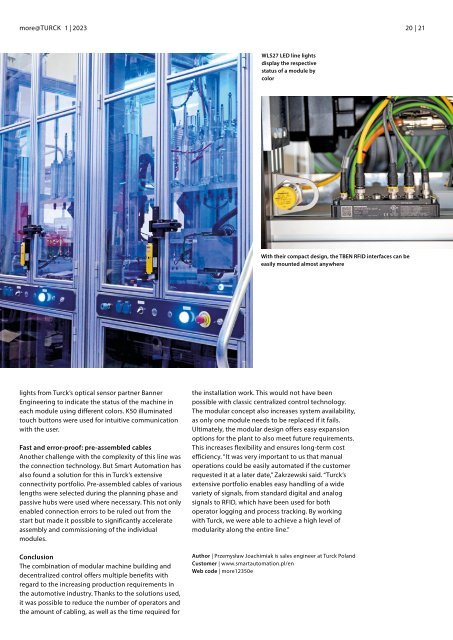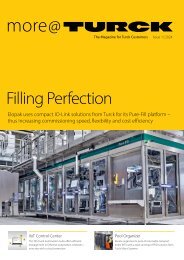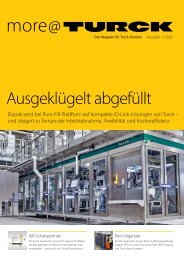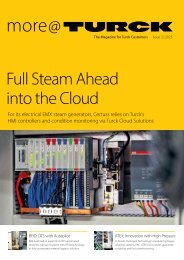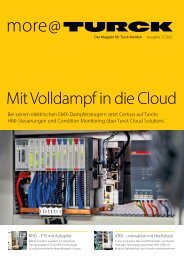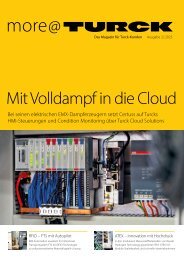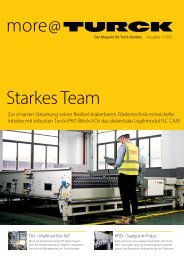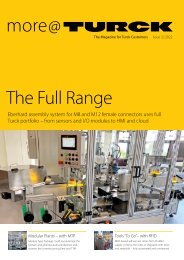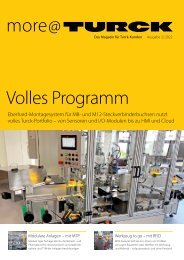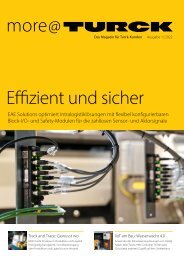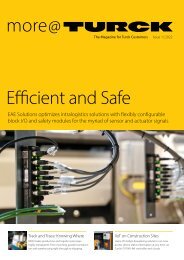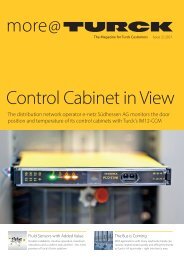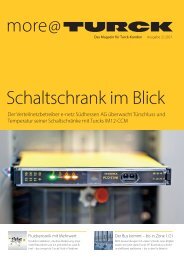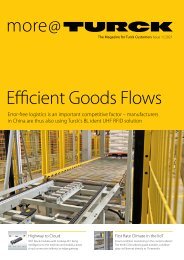more@TURCK 1_23 EN
The Magazine for Turck Customers
The Magazine for Turck Customers
You also want an ePaper? Increase the reach of your titles
YUMPU automatically turns print PDFs into web optimized ePapers that Google loves.
<strong>more@TURCK</strong> 1 | 20<strong>23</strong><br />
20 | 21<br />
WLS27 LED line lights<br />
display the respective<br />
status of a module by<br />
color<br />
With their compact design, the TB<strong>EN</strong> RFID interfaces can be<br />
easily mounted almost anywhere<br />
lights from Turck’s optical sensor partner Banner<br />
Engineering to indicate the status of the machine in<br />
each module using different colors. K50 illuminated<br />
touch buttons were used for intuitive communication<br />
with the user.<br />
Fast and error-proof: pre-assembled cables<br />
Another challenge with the complexity of this line was<br />
the connection technology. But Smart Automation has<br />
also found a solution for this in Turck’s extensive<br />
connectivity portfolio. Pre-assembled cables of various<br />
lengths were selected during the planning phase and<br />
passive hubs were used where necessary. This not only<br />
enabled connection errors to be ruled out from the<br />
start but made it possible to significantly accelerate<br />
assembly and commissioning of the individual<br />
modules.<br />
Conclusion<br />
The combination of modular machine building and<br />
decentralized control offers multiple benefits with<br />
regard to the increasing production requirements in<br />
the automotive industry. Thanks to the solutions used,<br />
it was possible to reduce the number of operators and<br />
the amount of cabling, as well as the time required for<br />
the installation work. This would not have been<br />
possible with classic centralized control technology.<br />
The modular concept also increases system availability,<br />
as only one module needs to be replaced if it fails.<br />
Ultimately, the modular design offers easy expansion<br />
options for the plant to also meet future requirements.<br />
This increases flexibility and ensures long-term cost<br />
efficiency. “It was very important to us that manual<br />
operations could be easily automated if the customer<br />
requested it at a later date,” Zakrzewski said. “Turck’s<br />
extensive portfolio enables easy handling of a wide<br />
variety of signals, from standard digital and analog<br />
signals to RFID, which have been used for both<br />
operator logging and process tracking. By working<br />
with Turck, we were able to achieve a high level of<br />
modularity along the entire line.”<br />
Author | Przemysław Joachimiak is sales engineer at Turck Poland<br />
Customer | www.smartautomation.pl/en<br />
Web code | more1<strong>23</strong>50e


